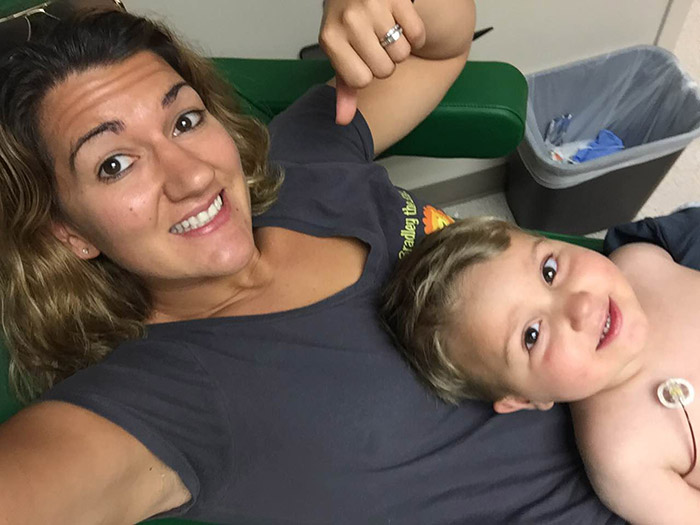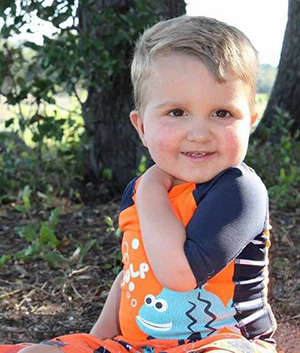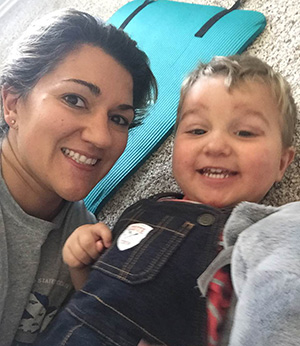When Jackie’s son Bradley was only 4.5 months old, he was diagnosed with acute lymphoblastic leukemia (ALL). Since diagnosis, he has experienced everything from an emergency blood transfusion in the middle of a dangerous thunderstorm to aggressive chemotherapy and treatment for peripheral neuropathy. The side effects of the therapy caused Bradley to be angry and wave his fists furiously, leading to the nickname the Incredible Hulk. Now at the age of 2, he continues to fight as hard as the Hulk would.

We asked Jacki a few questions about Bradley and the importance of children’s cancer research:
Q. How is Bradley doing today?
A. Bradley is doing well. He has been off treatment since August 12, 2016, but he is still receiving monthly antibiotic infusions. He also gets medicine daily for neuropathy pain, which he still experiences. He goes to physical therapy, occupational therapy, and speech therapy every week. He is also terrified of other kids his size so he goes to the Little Gym and playgrounds to socialize.
Q. Why did your family choose to support CureSearch?
 A. When Bradley was first diagnosed, we felt so helpless. We knew his life was in the hands of his doctors but also that his doctors were limited on treatments for his type of leukemia. We asked how we can help and the doctor recommended CureSearch, since a majority of donations go to actual research. With the help of Bradley’s followers, we raised over $12,000 on his group fundraising page alone and that doesn’t include others who did bake sales and fundraisers and sent in money separately.
A. When Bradley was first diagnosed, we felt so helpless. We knew his life was in the hands of his doctors but also that his doctors were limited on treatments for his type of leukemia. We asked how we can help and the doctor recommended CureSearch, since a majority of donations go to actual research. With the help of Bradley’s followers, we raised over $12,000 on his group fundraising page alone and that doesn’t include others who did bake sales and fundraisers and sent in money separately.
Q. What do you wish that more people knew about children’s cancer?
A. I wish that people knew that it existed, for one. It seems taboo to even talk about and the only time you hear about it is for St. Jude’s. Most people can’t relate because even if they knew someone with a child with cancer, most of the time they didn’t actually visit to St. Jude’s. Children get cancer every day, and while it is portrayed that there are high survival rates, every child is different and could be on the non-survival list. Plus, the treatments they offer are so harsh that kids have to live with permanent effects from treatment. How the government doesn’t believe in investing in our future is beyond me.
Q. What advice would you give to the parent of a child with cancer?
 A. The best advice I can think to give another parent with a child with cancer is to live in the moment every single day. There will be stages of grief when dealing with the diagnosis and some days are harder than others, especially when your child isn’t feeling well or you are stuck in the hospital. But when you are home, gather every piece of strength you can find and go out and live. Show your child the world, let them explore. And also don’t treat them like tomorrow isn’t promised. Believe in your heart that you are setting them up and molding them for their future.
A. The best advice I can think to give another parent with a child with cancer is to live in the moment every single day. There will be stages of grief when dealing with the diagnosis and some days are harder than others, especially when your child isn’t feeling well or you are stuck in the hospital. But when you are home, gather every piece of strength you can find and go out and live. Show your child the world, let them explore. And also don’t treat them like tomorrow isn’t promised. Believe in your heart that you are setting them up and molding them for their future.
Q. What would you tell someone who may not think that their support of CureSearch would make a difference?
A. If someone felt that CureSearch didn’t make a difference, I would remind them how little funding children get from the government. Tell them that every penny counts because it adds up. Let them know how you spread our son’s story to reach others and how just one share can help make hundreds of more people aware that childhood cancer exists. It is a vicious beast that we could help cure if we just spoke up for our kids.
Want more stories like this?
Get emails that matter, when it matters.
